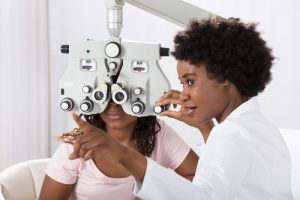Each May, eye care providers traditionally observe Healthy Vision Month. We want to remind our Minnesota Eye Consultants patients to think about how important good vision is to their lives.
There are things that they can do to maintain healthy vision. People who already have an eye disease or compromised vision can still take steps to maintain the best vision possible.
This year COVID-19 may generate some special issues related to eye health. The team at Minnesota Eye Consultants is here to point out ways to take care of your vision during this pandemic.
Get Regular Eye Exams

The most important thing you can do to maintain healthy vision is to have a regular comprehensive eye examination. This is different from only having your vision checked to see if you need glasses.
A comprehensive exam involves temporarily dilating the eye with eye drops. This enables your eye doctor to see if the retina and optic nerve at the back of the eye look healthy.
You may think that your eyes are fine because you aren’t noticing any vision problems. But there are many serious eye conditions where people don’t notice symptoms in the early stages.
Glaucoma is a perfect example of this. It attacks the peripheral vision before it affects the central vision. Because of this, patients may not notice its subtle progression.
Glaucoma can cause blindness, but there are many effective treatments if it is diagnosed in the early stages.
Watch out for Screen Time

Social distancing and quarantine are causing people of all ages to spend more time on their computers and smartphones. Many people are working at home.
It’s now normal to attend several meetings per day online instead of in person. Online classes are substituting for live classrooms for students of all ages.
Seniors are trying to reduce isolation by using things like Zoom and FaceTime to connect with friends and loved ones. Everyone is watching more TV or streaming movies to try and stay entertained.
Excessive screen time causes dry eye symptoms and eye strain in many people. Because people blink less while using screens, the eyes don’t get enough natural lubrication.
Give your eyes frequent breaks. When possible, take a break from your computer or TV every 20 minutes or so and get up and move around.
If you can’t do that because you are working, follow the “20-20-20 rule”. With the 20-20-20 rule, focus your eyes on an object 20 feet away every 20 minutes for 20 seconds. This helps your eyes refocus and reduces the likelihood of experiencing symptoms of eye strain.
Protect Your Eyes from Injury

Now that spring is finally here, you may want to get outside and start gardening and yard work. Some ophthalmologists have noticed an increase in eye injuries during this pandemic.
Be sure to wear protective goggles if you are doing projects inside and outside the house. Many eye injuries result from lawnmowers hitting small rocks that become projectiles. They can also result from trimming and pruning bushes.
While there are no organized sports activities right now, you may be playing various types of ball or street hockey with your children. Be sure that everyone is still wearing the appropriate type of protective goggles for these sports.
Shield Your Eyes from UV Light

Walking and biking are some of the safest physical activities that people can take part in while social distancing. Most people know that the sun’s ultraviolet rays can cause skin cancer, but not everyone realizes that UV rays can harm your eyes as well.
All members of your family should wear sunglasses with 100% UV protection whenever they are outside. Wraparound sunglasses are optimal in keeping out UV rays from the side.
Hats with visors are especially useful in preventing UV rays coming from above the eyes. Don’t forget that the sun’s damaging UV rays can penetrate on cloudy days as well as sunny ones.
Be Especially Careful with Contact Lenses

Be sure to wash your hands thoroughly every time you insert or remove your contact lenses. If you have unknowingly touched a contaminated surface, touching your face and exposing mucous membranes can put you at high risk for contracting COVID-19.
All public health experts are recommending that you avoid touching your face as a preventive measure. It may be less risky to stick to only wearing your glasses until the pandemic subsides.
If you have to wear your contacts, do your best to keep your hands as clean as possible when touching them. Once they are in your eyes, try to not have to take them out before the end of the day to reduce how much you need to touch your eyes or face throughout the day.
Eat Healthy Foods

Eating nutritious foods is particularly important to maintaining healthy vision. Eat lots of dark green leafy vegetables such as spinach, kale, and collard greens.
Fish that are high in Omega-3 fatty acids, such as salmon, mackerel, and tuna should be part of your diet once or twice a week. Try to include fruit in your meals and snacks.
Vitamins A, D, and E, as well as bioflavonoids, lutein, zeaxanthin, and zinc, are also key nutrients that can benefit and protect your vision. Eating healthy can make a big difference if you’ve been feeling sluggish or despondent while in quarantine.
Quit Smoking

Everyone knows that smoking is not good for your health, but you may not have thought about how it impacts your eyes. Smoking can cause cataracts.
Smokers are also three times as likely to develop macular degeneration, which is a leading cause of blindness. Quitting smoking is one of the most important health choices that you can make.
Get Healthy

It’s never too late to focus on improving your health. Preventing chronic diseases is vital to supporting healthy vision.
Keep your blood pressure and cholesterol under control. Find a regular exercise routine that is right for you and stick to it.
Exercise helps with your well-being and is a vital part of maintaining a healthy weight.
Diabetes, obesity, and high blood pressure all put you at risk for developing vision problems.
Diabetes can cause several serious eye diseases, including diabetic retinopathy. If you already have been diagnosed with diabetes, keep your blood sugar, and A1C levels under control with medications, exercise, and healthy dietary choices.
You may need to change your usual exercise routine during the pandemic, but you can walk outside or find exercise ideas online.
We hope that all our Minnesota Eye Consultants patients stay healthy and safe during this time! Have questions about your eye health? Schedule an appointment at Minnesota Eye Consultants in Minneapolis, MN today!









